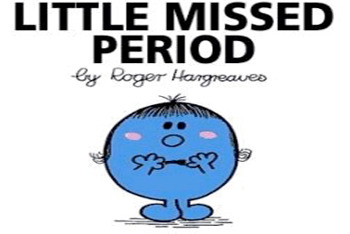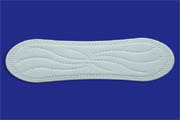Dear Dish-it,
What exactly is a missed period??????
saradevi1
 Missed Period
Missed Period
Dear saradevi1,
Some girls' periods arrive like clockwork. Others get theirs at slightly different times each month. Many girls get regular periods most of the time, but occasionally skip a period or get an extra period during times of pressure or stress. In fact, you may notice that when you go on a trip or have a major change in your schedule your period is late. All of this is perfectly normal.
It's also normal for the number of days a girl has her period to vary. Sometimes a girl may bleed for 2 days, sometimes it may last a week. That's because the level of hormones the body manufactures can be different from one cycle to the next, and this affects the amount and length of bleeding.
So how can you tell when you're about to get your period? If your cycle is not regular, you'll want to pay attention to the clues your body may give you. These include:
- back cramps or stiffness
- heavier breasts or breast soreness
- headaches
- acne breakouts
- disturbed sleep patterns
- mood swings
- bloating
Most of the time, irregular periods are part of the normal changes that can happen when you're a teen. At some point as you grow, your cycle will probably settle into a recognizable pattern. This usually happens by 3 years after your first period.
However, some teens may develop irregular periods, or stop having periods altogether, as a result of certain medications, excessive exercise, very low body weight, or not eating enough calories. Others may develop problems as a result of a hormone imbalance. For example, disorders of the thyroid gland can cause menstrual irregularities if the levels of thyroid hormone in the blood become too low or too high.
Some women have irregular periods because their bodies produce too much androgen, which is a hormone that causes increased muscle mass, facial hair, and deepening of the voice in males and the development of pubic hair and increased height in girls. High amounts of androgen can also cause hair growth on the face, chin, chest, and abdomen, and is sometimes associated with excessive weight gain.
If you have any of these problems, or if your periods are irregular for 3 years or more, see a doctor. The doctor may prescribe hormone pills or other medications or recommend lifestyle changes that can help you to have regular periods.
It's important to see a doctor if you're sexually active and have missed a period. This could be a sign of pregnancy. You should also see your doctor if you start having periods that last longer than 7 days, are heavy, or are accompanied by severe cramping or abdominal pain.
In the meantime, if your periods are irregular, try keeping some pads or tampons in your backpack, just so you'll have them handy in case your period comes when you're not expecting it.
Related Stories:
- All About Your Period
- Swimming With Your Period
- I Haven’t Had My Period
- When Will I Get My Period?
- How Do I Know If I’m Getting My Period?
- Your First Period
- Puberty 411
- I Keep Skipping Periods

































